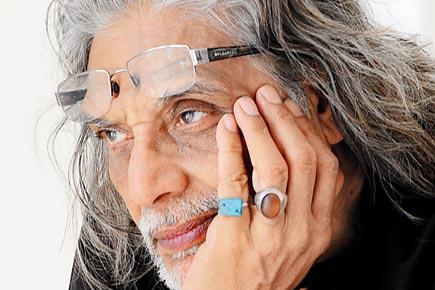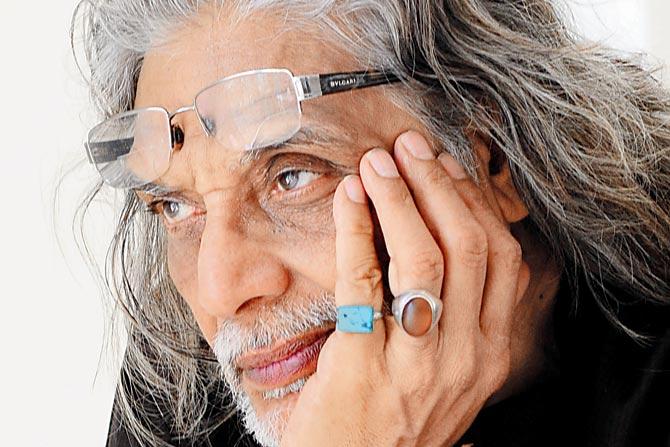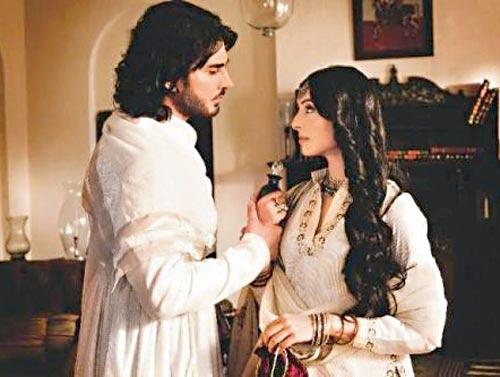Muzaffar Ali talks about putting the past into perspective and educating today's youth on the cultural history of pre-Independent India and also his latest film 'Jaanisaar'

Muzaffar Ali
As we enter Muzaffar Ali's Juhu bungalow, we are greeted by his pet dog, Masti, who lies sprawled on a couch specially made for him. The walls are adorned with his paintings and framed poetic verses — apart from being a producer-director, the 70-year-old is a painter, writer, poet and fashion designer too.
ADVERTISEMENT

Muzaffar Ali
Ali enters the living room, dressed in an ivory coloured shirt and grey trousers, his white mane kissing his shoulders. His grandchild, Imaan (son of filmmaker Shaad Ali) starts babbling away at his sight. We are meeting Ali to discuss his return to Bollywood after almost three decades with the soon-to-be-released 'Jaanisaar'. Much like his Rekha-starrer classic, 'Umrao Jaan' (1981), this film too is set around the time of India's first war of independence in 1857. In a candid chat with hitlist, the multi-faced personality explains how he is getting a hang of the publicity blitzkrieg associated with films nowadays...

A still from 'Jaanisaar'
Q. Do you feel like a beginner considering the filmmaking process has completely changed now?
A. Since my son (Shaad Ali) is also a filmmaker, there is always talk of films at home. So, it is not that I was totally cut off from it. I might be making a film after years, but there's other stuff that has kept me busy — from my fashion label to my Sufi music festivals to art and poetry. The people I work with are all young, so I am attuned to what is happening now. What I am learning to grapple with is the market realities of today — how to get an opening with less pressure.
Q. Why do you choose the Indian Rebellion of 1857 as the backdrop for all your films?
A. That's because I want to put the past into perspective for the cultured evolution of our society. Today's youth is evolving with a lot of gaps. There are certain things they ought to know. Some things have been purposely taken out. People have been misled and misdirected. Our democracy is in the doldrums. We are at a crossroads — who to choose, why to choose. In a way, we are going through the dark ages. We need to know what has been going wrong since our first war of independence in 1857. We have to put on our thinking caps. Why does Hollywood keep making films on the American civil war and the holocaust? To make the newer generations aware of what went wrong.
Q. You have always worked with stars. Why did you decide to cast new faces in Jaanisaar?
A. It is what I, as a director, perceive of them and what I can make of them. This is where the challenge lies for a filmmaker. I cast Imran Abbas after seeing his snapshots. I had not seen him in his Pakistani TV shows and had no idea of his Bollywood aspirations. As far as designer Pernia Qureshi is concerned, I saw her as an interesting raw material that I could mould.
Q. Have you seen the remake of Umrao Jaan by JP Dutta in 2006?
A. I had heard of it, but I have not seen it. But what is heartening for me is that my film even three decades later is appreciated. There are people who have been born years after Umrao Jaan was made and have seen it… its songs are still remembered.
Q. You have also turned actor with your upcoming film...
A. This is one more facet to me. My son, Shaad, has directed the scenes featuring me. As my character had to have coloured eyes, I wore contact lenses and due to the discomfort, I wanted him to shoot the scenes as fast as possible.
 Subscribe today by clicking the link and stay updated with the latest news!" Click here!
Subscribe today by clicking the link and stay updated with the latest news!" Click here!






